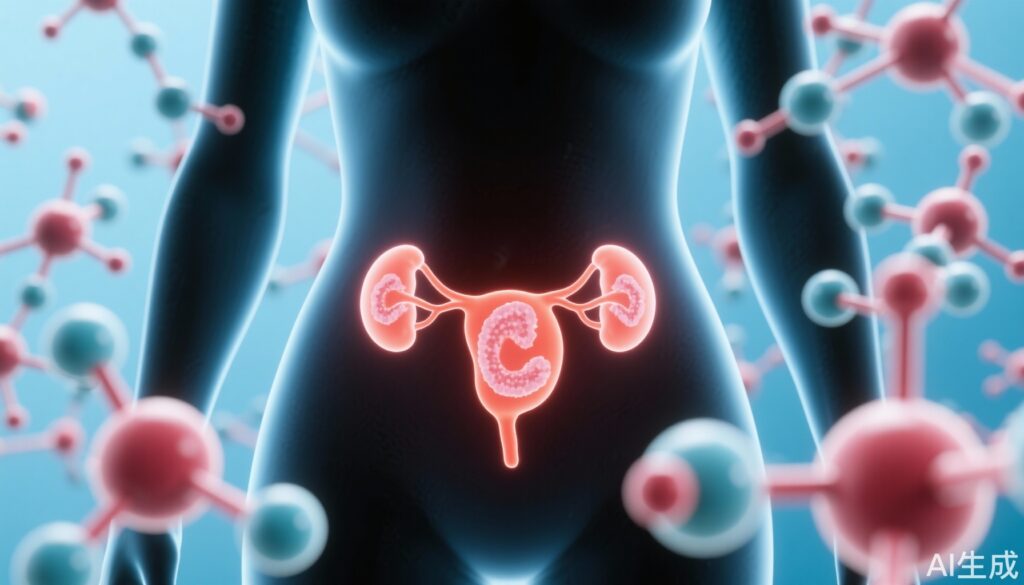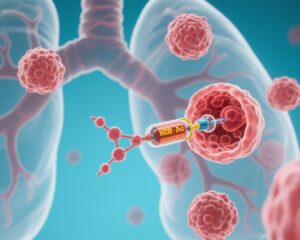Highlight
- The combination of avutometinib (a MEK clamp) and defactinib (a focal adhesion kinase inhibitor) showed an objective response rate of 31% in recurrent LGSOC patients with prior treatments.
- Patients harboring KRAS mutations exhibited higher response rates (44%) and longer progression-free survival (22.0 months) compared to KRAS wild-type patients.
- The treatment’s safety profile was manageable, with grade ≥3 adverse events including elevated creatine phosphokinase, diarrhea, and anemia; 10% of patients discontinued due to toxicity.
- These data support further investigation of this combination and underpin an ongoing phase III trial comparing it with standard therapies.
Study Background and Disease Burden
Low-grade serous ovarian cancer (LGSOC) represents a rare but distinct subtype of epithelial ovarian cancer characterized by chemoresistance and an indolent yet persistent clinical course. Unlike high-grade serous ovarian cancers, LGSOC exhibits limited responsiveness to conventional platinum-based chemotherapy, posing an unmet need for novel targeted therapies. The presence of activating mutations in genes such as Kirsten rat sarcoma virus homolog (KRAS) implicates aberrant MAPK pathway signaling as a key driver in tumorigenesis and treatment resistance. Targeting MAPK signaling via MEK inhibition has shown promise; however, resistance mechanisms and suboptimal efficacy necessitate combinatorial approaches.
Avutometinib is a novel MEK clamp inhibitor designed to potently and selectively trap activated MEK, thereby disrupting downstream ERK signaling. Defactinib is a focal adhesion kinase (FAK) inhibitor that can modulate tumor microenvironment interactions and potentially enhance antitumor activity. Preclinical rationale supports combining MEK and FAK inhibition to overcome therapeutic resistance in LGSOC.
Study Design
ENGOT-OV60/GOG-3052/RAMP 201 was a phase II, open-label, randomized clinical trial investigating the efficacy and safety of avutometinib alone or in combination with defactinib in patients with recurrent, measurable LGSOC following at least one prior line of platinum-based chemotherapy. The trial stratified patients by tumor KRAS mutation status, given its prognostic significance.
Patients were randomized to receive oral avutometinib 4.0 mg twice weekly as monotherapy or a combination regimen of avutometinib 3.2 mg twice weekly plus oral defactinib 200 mg twice daily. The combination arm was subsequently selected as the go-forward regimen for expansion based on preliminary data.
The primary endpoint was objective response rate (ORR), assessed by blinded independent central review according to RECIST criteria. Secondary endpoints included duration of response, progression-free survival (PFS), and safety outcomes.
Key Findings
A total of 115 patients received the combination regimen. Participants had a median of three prior systemic therapies (range 1-9), with frequent exposure to hormonal therapy (86%), bevacizumab (51%), and prior MEK inhibitors (22%). This underscores the heavily pretreated nature of the cohort.
Confirmed ORR for the combination therapy was 31% (95% CI: 23%-41%) with a notably durable median duration of response of 31.1 months (95% CI: 14.8 – 31.1 months). These data signify sustained benefit for responders despite multiple prior treatment failures.
Stratification by KRAS mutation status revealed markedly superior outcomes in the mutant cohort. Specifically, ORR reached 44% in KRAS-mutant tumors versus 17% in KRAS wild-type, illustrating predictive biomarker utility. Median PFS mirrored this trend, with 22.0 months (95% CI: 11.1 – 36.6) for KRAS mutants compared to 12.8 months (95% CI: 7.4 – 18.4) in wild-type patients. Overall median PFS was 12.9 months (95% CI: 10.9 – 20.2).
Regarding safety, treatment-related adverse events of grade 3 or higher occurred with the highest frequencies for elevated creatine phosphokinase (24%), diarrhea (8%), and anemia (5%). These toxicities were generally manageable. Treatment discontinuations due to adverse events were reported in 10% of patients. The toxicity profile supports a favorable benefit-risk ratio, especially in this refractory population.
Expert Commentary
The ENGOT-OV60 phase II trial provides compelling evidence for combinatorial MEK and FAK inhibition in LGSOC, a disease with limited chemotherapeutic options. The durable responses and favorable PFS observed, particularly in KRAS-mutated tumors, suggest the combination uniquely targets critical oncogenic pathways. These results align with mechanistic insights whereby simultaneous blockade of MAPK signaling and tumor-matrix interactions impairs tumor growth and resistance emergence.
However, the open-label design and lack of a control arm temper interpretations, necessitating validation in a randomized context. Prior exposure to MEK inhibitors in a subset of patients and variable molecular heterogeneity may influence outcomes. Additionally, the management of MEK/FAK inhibitor toxicities requires clinical vigilance.
Ongoing phase III evaluation (RAMP301) comparing this combination against physician’s choice of therapy will clarify definitive clinical positioning. It will be important to incorporate molecular stratification strategies to optimize patient selection and maximize therapeutic efficacy.
Conclusion
Avutometinib combined with defactinib demonstrates significant activity and acceptable safety in heavily pretreated recurrent LGSOC, especially among patients with KRAS mutations. The encouraging durable responses and progression-free survival affirm its potential as a new standard of care option. Pending results of the ongoing phase III randomized trial, this combination may represent a pivotal advancement in targeted therapy for recurrent LGSOC, addressing a critical unmet clinical need.
References
Banerjee SN, Van Nieuwenhuysen E, Aghajanian C, et al. Efficacy and Safety of Avutometinib ± Defactinib in Recurrent Low-Grade Serous Ovarian Cancer: Primary Analysis of ENGOT-OV60/GOG-3052/RAMP 201. J Clin Oncol. 2025;43(25):2782-2792. doi:10.1200/JCO-25-00112
Additional references can be retrieved as pertinent to MEK inhibitors, FAK inhibitors, LGSOC treatments, and KRAS mutation impacts in ovarian cancer.



